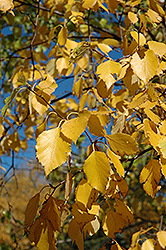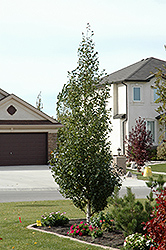>> Home
Chickadee Paper Birch*
Betula papyrifera 'Chickadee'
* This is a "special order" plant - contact store for details
Height: 50 feet
Spread: 15 feet
Sunlight:
![]()
![]()
Hardiness Zone: 2a
Other Names: White Birch, Canoe Birch
Description:
A selection of paper birch with snow-white peeling bark and gold fall color; its narrowly pyramidal habit is great for smaller spaces; less susceptible to birch borer attack; a great accent tree, and one of the best for winter interest
Ornamental Features
Chickadee Paper Birch has dark green deciduous foliage on a tree with a pyramidal habit of growth. The pointy leaves turn an outstanding gold in the fall. The peeling white bark is extremely showy and adds significant winter interest.
Landscape Attributes
Chickadee Paper Birch is a deciduous tree with a distinctive and refined pyramidal form. Its average texture blends into the landscape, but can be balanced by one or two finer or coarser trees or shrubs for an effective composition.
This is a relatively low maintenance tree, and should only be pruned in summer after the leaves have fully developed, as it may 'bleed' sap if pruned in late winter or early spring. Deer don't particularly care for this plant and will usually leave it alone in favor of tastier treats. It has no significant negative characteristics.
Chickadee Paper Birch is recommended for the following landscape applications;
- Accent
- Shade
Planting & Growing
Chickadee Paper Birch will grow to be about 50 feet tall at maturity, with a spread of 15 feet. It has a low canopy with a typical clearance of 3 feet from the ground, and should not be planted underneath power lines. It grows at a medium rate, and under ideal conditions can be expected to live for 70 years or more.
This tree does best in full sun to partial shade. It prefers to grow in average to moist conditions, and shouldn't be allowed to dry out. It is not particular as to soil type or pH. It is somewhat tolerant of urban pollution. Consider applying a thick mulch around the root zone in winter to protect it in exposed locations or colder microclimates. This is a selection of a native North American species.
* This is a "special order" plant - contact store for details

